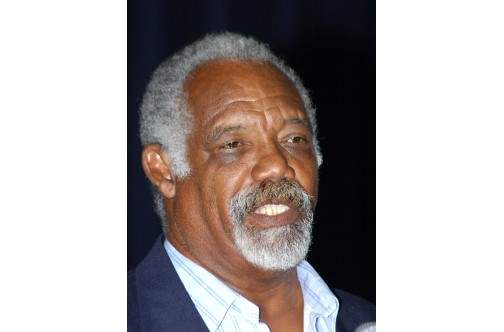Dennis Johnson remembered as ‘architect’ of Jamaica’s track and field
Former Jamaican sprinter, coach and administrator Dennis “DJ” Johnson, who died on Thursday from complications of COVID-19, has been described as “celebrated architect of Jamaica’s track and field edifice” and “key player in the development of Jamaican track and field”.
Tributes on Friday after news broke that the former sprinter, who equalled the then World Record 9.3 seconds for the 100 yards three times in 1961, had died.
Johnson, who represented Jamaica at two Olympic Games of 1960 and 1964, was 81.
He was part of Jamaica’s 4x100m relay team that finished fourth at the 1964 Tokyo Olympics, the first time a Jamaican team was making it to the final.
The Jamaican track and field legend was also instrumental in setting up the sports programme at the then College of Arts Science and Technology (CAST), now the University of Technology (UTech), Jamaica.
Johnson was also part of the Jamaican coaching set up at seven Olympic Games — in 1980, 1988, 1992, 1996, 2000 and 2004. He was also instrumental in the formation of the ‘Bolts of Lightning’ relay teams at CAST that were the first local men’s 4x100m relay team to run under 40.00 seconds,
Garth Gayle, president of the Jamaica Athletics Administrative Association (JAAA), expressed his and the federation’s sadness at the news of Johnson’s passing, describing him as an “iconic Jamaican sprinter and coach”.
“Dennis lived a long and full life doing what he loved [which was] interacting with people, especially athletes. He never missed a moment to impart knowledge and crucial tips to anyone who would listen. He gave 100 per cent to his country on all occasions. DJ worked well with the National teams he accompanied abroad, giving invaluable tips and guidance to every athlete, especially his sprinters. He will be sorely missed,” he said.
Gayle said Johnson, who was conferred with the Order of Distinction by the Government in 2001, “revolutionised coaching and sprinting programmes at his base, the University of Technology. He was a mentor par excellence, guiding many young athletes to successes some never dreamt of.
“The Jamaica Athletic Administrative Association sends condolence to his family, friends and countless mentees, asking them to stay strong in these tough times. May his soul rest in peace,” Gayle noted.
In his tribute, president of the Jamaica Olympic Association (JOA) Christopher Samuda described DJ, as he was affectionately, as “a celebrated architect of Jamaica’s track and field edifice and the quintessential expression of humility in the face of prodigious Olympic and other accomplishments”.
“He was a world record holder, the character of which transcended the yardage of one hundred which he traversed on the track. He was the coach’s coach who understood the aspirations of his students and embraced the responsibility he had to create excellence.
“Dennis Osric Johnson will be remembered as a faithful custodian of the values of sport and a father who nurtured many youth to imprint their spikes with timeless merit on this planet we call Earth and said, ‘The JOA reflects with ineffable pride on the stature of an Olympian and with reverence on the soul of a man who we knew well and respected’,” said Samuda.
Marvin Anderson, president of the Olympians Association of Jamaica (OAJ), said Johnson “has been hailed as a key player in the development of Jamaican track and field and an example for others to follow”.
Johnson’s passing, he said, “is a major loss as his achievements on the track and off it have a profound effect on the development of Jamaican track and field”.
Anderson praised the former Calabar High star “for his work at the College of Arts, Science and Technology, where he was director of sports from 1971 to 2005”.
“He showed us that we had the potential to nurture out talent in Jamaica,” said the OAJ head.
Anderson noted that Johnson, who was fifth in the 100m at both the 1959 PanAm Games and at the 1962 Commonwealth Games, “went on to build the platform for world-class athletes to be produced at home in Jamaica”.
“Few people know that DJ paved the way for the transformation of our athletics by facilitating the location of the MVP Track at UTech in 1999. His decision has paid massive dividends for all Jamaicans,” said Anderson.
Anderson, the 2008 Olympian, said Johnson’s life “is an example to all sportsmen of the Olympic spirit and was a widely sought after lecturer on sprinting. It’s painful to lose him and we convey our sympathies and support to his family”.
Anthony Davis, who held the position of director of sports at UTech until recently, spoke about Johnson’s work in building the sports programme at UTech.
“Dennis joined the CAST family in 1971, not as staff, [but] as a volunteer who was the sports development officer for Carrera’s Sports Foundation and operated out of an office at National Stadium.”
Davis, who was a student at the time, said he recalled Johnson saying in 1971 “we can develop world record holders right here on CAST campus”.
“Additionally, he shared the view that for a young institution if we wanted international exposure, the surest way to achieve that goal was to produce world class athletes,”Davis noted.
Johnson, he said, “held the view that anyone with the basic physical attributes could be taught to sprint”.
Davis credited the “transformation of the local collegiate programme” to Johnson, and added: “Ultimately, the success of the home-based athletes on the international arena. There can be no discussion on the development and success of the local programme without acknowledging the pioneering work by Dennis ‘DJ’ Johnson.”







 and then
and then